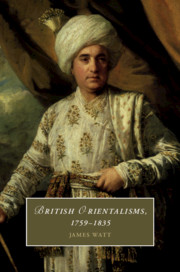Book contents
- British Orientalisms, 1759–1835
- Cambridge Studies in Romanticism
- British Orientalisms, 1759–1835
- Copyright page
- Contents
- Acknowledgements
- Introduction
- Chapter 1 ‘Those Islanders’
- Chapter 2 ‘Indian Details’
- Chapter 3 ‘All Asia Is Covered in Prisons’
- Chapter 4 ‘In Love with the Gopia’
- Chapter 5 ‘Imperial Dotage’ and Poetic Ornament in Romantic Orientalist Verse Narrative
- Chapter 6 Cockney Translation
- Chapter 7 ‘It Is Otherwise in Asia’
- Conclusion
- Bibliography
- Index
- Cambridge Studies in Romanticism
Chapter 3 - ‘All Asia Is Covered in Prisons’
Oriental Despotism and British Liberty in an Age of Revolutions
Published online by Cambridge University Press: 31 July 2019
- British Orientalisms, 1759–1835
- Cambridge Studies in Romanticism
- British Orientalisms, 1759–1835
- Copyright page
- Contents
- Acknowledgements
- Introduction
- Chapter 1 ‘Those Islanders’
- Chapter 2 ‘Indian Details’
- Chapter 3 ‘All Asia Is Covered in Prisons’
- Chapter 4 ‘In Love with the Gopia’
- Chapter 5 ‘Imperial Dotage’ and Poetic Ornament in Romantic Orientalist Verse Narrative
- Chapter 6 Cockney Translation
- Chapter 7 ‘It Is Otherwise in Asia’
- Conclusion
- Bibliography
- Index
- Cambridge Studies in Romanticism
Summary
The conclusion to Hartly House, Calcutta invites readers to recognize the plight of those who ‘shared with English women their common oppression by English men’. During the impeachment of Hastings, Burke-inspired works such as Hugh Mulligan’s poem ‘The Virgins’ similarly made use of the rape metaphor in order to symbolize the effects of EIC rule. Other fictions of the 1770s and 1780s depicted English and Indian women who were victims of Indian men, however, and in doing so drew on and further circulated an already well-established sense of sexual despotism as a specifically ‘Eastern’ phenomenon. Where India is concerned, much recent criticism has emphasized the intellectual and creative cross-fertilization that took place under the EIC’s aegis during the Hastings era. There is a parallel story to tell about British metropolitan imaginings of ‘the East’ in the late eighteenth century, though, and it concerns the ossification of unexamined claims about the benighted condition of seraglio-bound women across ‘Asia’ as a whole – the seeming inescapability of this notion an index of its ideological usefulness. In schematic terms, it might therefore be said that if a ‘Burkean’ or ‘Jonesian’ Orientalism sought to identify forms of affinity and resemblance between peoples and cultures, this account of a generalized state of Oriental despotism in which men tyrannized over women in turn eschewed any such imaginative openness to the East.
- Type
- Chapter
- Information
- British Orientalisms, 1759–1835 , pp. 90 - 122Publisher: Cambridge University PressPrint publication year: 2019



